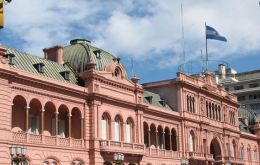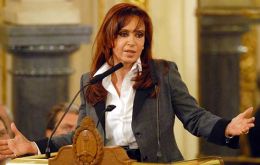MercoPress. South Atlantic News Agency
Tag: Indec
-
Thursday, February 24th 2011 - 07:06 UTC
Argentina’s industrial output up 10.3% in January over a year ago

Argentina’s industrial output climbed 10.3% during January compared to the same month in 2010, according to the Indec national statistics bureau. The volume reported was higher than the one expected by analysts, who had announced an 8.1 percent increase of the Industrial Monthly Estimator (EMI) in January.
-
Wednesday, February 23rd 2011 - 06:45 UTC
Fourth quarter unemployment in Argentina down to 7.3%, says Indec

Argentina's unemployment rate fell to 7.3% in the fourth quarter of 2010, according to a Tuesday release from the country’s national statistics institute, Indec. Argentine President Cristina Fernandez de Kirchner had announced the number informally in a speech last week.
-
Saturday, February 19th 2011 - 06:08 UTC
Argentine economy expanded 9.1% in 2010, announces Cristina Kirchner

President Cristina Fernandez de Kirchner announced Friday that Argentina’s economy is 2010 expanded 9.1% and unemployment in the fourth quarter experienced a further drop and now stands at a record low of 7.3%.
-
Thursday, February 17th 2011 - 03:22 UTC
International tourism influx to Argentina increased 27.1% during 2010

The number of foreign tourists visiting Argentina jumped 27.1% in 2010 compared to the year before, while dollars spent increased 25.9% according to air and sea arrivals and City of Buenos Aires numbers compiled by the country’s Statistics and Census Office, Indec.
-
Thursday, February 17th 2011 - 01:18 UTC
Argentina’s boost-industry import restrictions estimated in one billion US dollars

Imports restrictions imposed this week by the Argentine government with the purpose of “preserving the re-industrialization process” cover approximately 200 products totalling annual imports of a billion US dollars, according to preliminary reports.
-
Monday, February 14th 2011 - 03:36 UTC
Argentines accept inflation is in the range of 25%, but divided on the causes

A majority of Argentines, 74%, believes that inflation is harming their finances and a similar percentage, 74%, considers the administration of President Cristina Fernandez de Kirchner is hardly interested in the issue, according to a public opinion poll published Sunday in Buenos Aires La Nacion.
-
Friday, February 11th 2011 - 06:52 UTC
Argentine business leaders urge government to “stop denying inflation”

The head of Argentina’ powerful Business Leaders Association (ADE) urged the government to “stop denying inflation” and rejected the notion that businessmen are responsible for price hikes.
-
Tuesday, December 21st 2010 - 05:14 UTC
Argentina’s current account balance down to 900 million USD in third quarter

Argentina's current account balance--the broadest measure of a country's transactions with the rest of the world—posted a 900 million US dollars surplus in the third quarter, but was down slightly from expectations and the performance from a quarter earlier.
-
Saturday, December 18th 2010 - 03:10 UTC
Argentine population grows 10.6% in a decade, totals 40.09 million

Argentina has 40.09 million inhabitants, up 10.6% from the 2001 figure of 36.2 million, according to preliminary results from the 2010 National Census of Population, Households and Homes released on Friday.
-
Thursday, December 16th 2010 - 23:52 UTC
IMF technical support for Argentina Statistics Office will continue until next April

International Monetary Fund (IMF) will continue collaborating with Argentina national statistics bureau, Indec, in order to create “a price index with stronger credibility,” the spokeswoman of the organization, Caroline Atkinson, assured in Washington.
